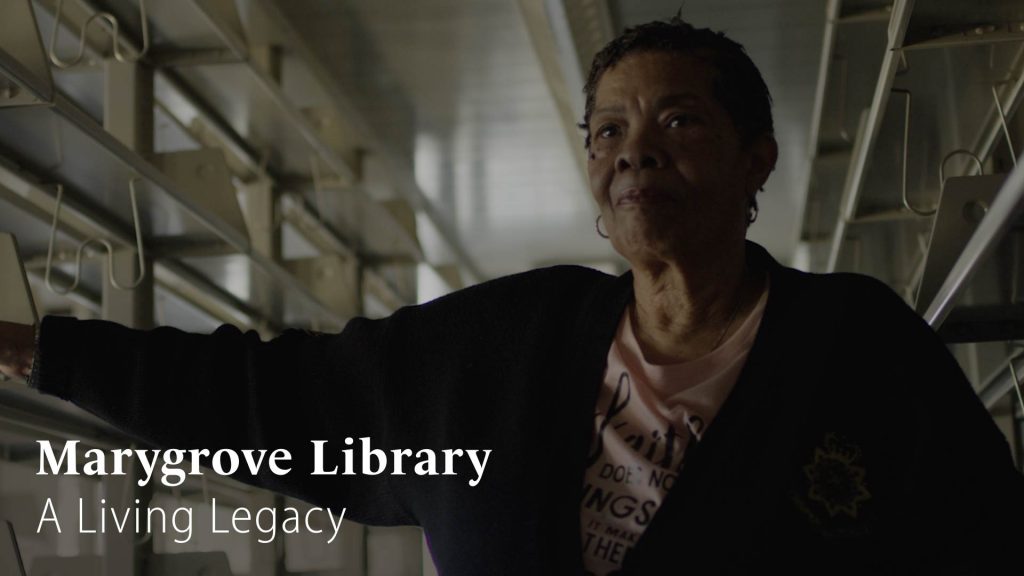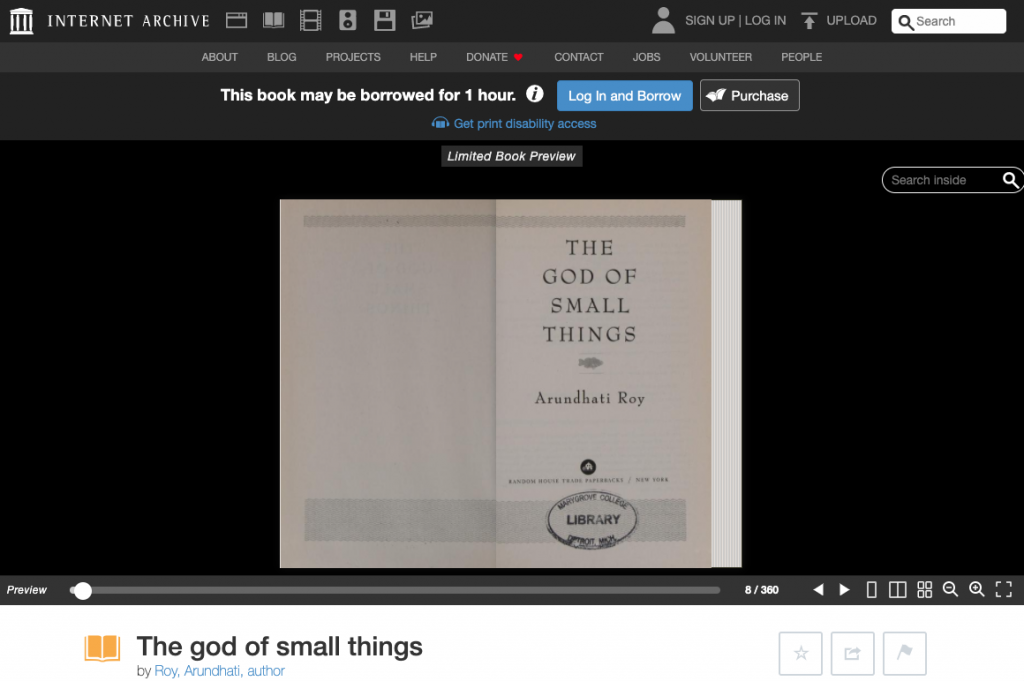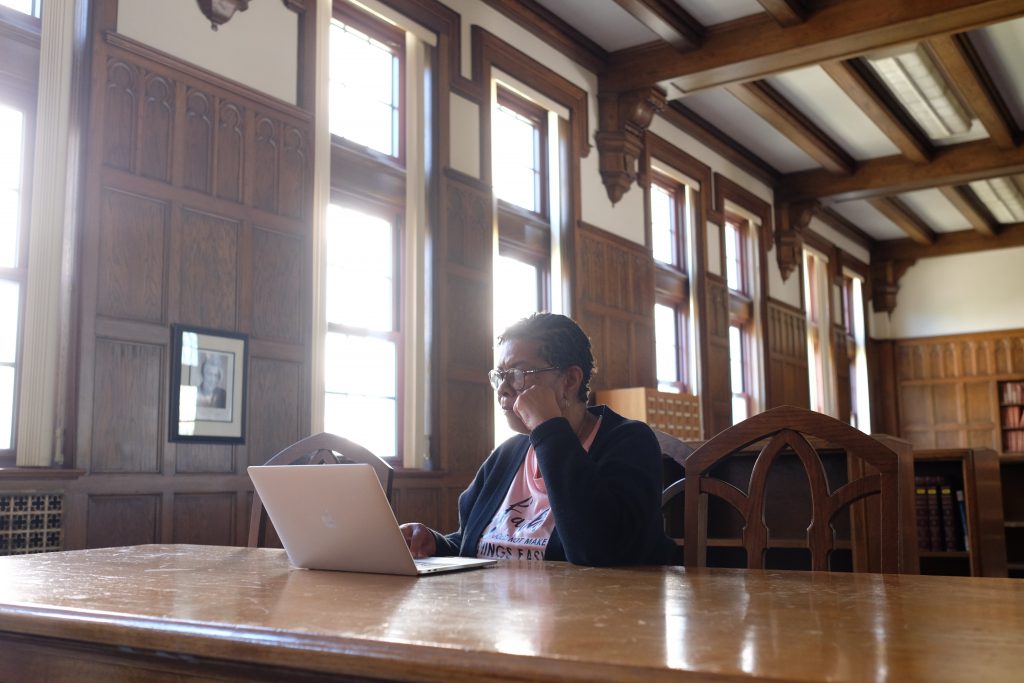When Marygrove College in Detroit decided to close its doors in 2019 due to financial pressures, the first question on the minds of many community members was: what about the library? Today, the entire Marygrove College community is celebrating the reopening of the Marygrove College Library in partnership with the Internet Archive.

Marygrove College’s roots go back to 1905 when it was started by the Sisters, Servants of the Immaculate Heart of Mary, a progressive Catholic order known for its commitment to social justice. Founded as a women’s institution, it became co-ed and predominantly African American over time, changing with the demographics of its neighborhood in northwest Detroit.
The liberal arts college, which typically had an enrollment of less than 1,000, attracted students interested in teacher education and social work programs, as well as English, history, philosophy and religious studies. The college offered graduate programs and some alumni went on to become physicians, lawyers and scientists.
True to its mission, Marygrove often served students from marginalized communities with limited means. Changes in access to federal Pell grants hurt the institution’s finances, and enrollment dwindled in recent years.
“The college was deeply in debt. Like many small colleges, institutional scholarships don’t pay the bills. The school was borrowing to make payroll. It was not a good picture,” says Marygrove President Elizabeth Burns. “With great sorrow, the board voted in summer 2017 to close undergraduate programs.”
The institution tried to survive by offering only graduate programs – many online. But that model proved to be unsustainable. In December of 2019, Marygrove closed its doors for good.
“It was very difficult,” says Frank Rashid, who taught English at the college for 37 years and lives within a mile of the campus. “It was a great place to teach. Despite our size and obscurity, we had a strong faculty and great students.”
As the college emptied its buildings, the fate of Marygrove’s beloved library was up in the air.
Marygrove’s solution: Donate the entire library to the Internet Archive for digitization and preservation.
As the college emptied its buildings, the fate of Marygrove’s beloved library was up in the air. No other library was able to house the entire collection, which included more than 70,000 books and 3,000 journals, in addition to microfilm, maps, visual media, and more. The college explored selling the books, but buyers were only interested in portions of the collection. Even disposing of the library content would cost thousands of dollars that the college couldn’t afford.
Marygrove’s solution: Donate the entire library to the Internet Archive for digitization and preservation.
“We were able to preserve the entire collection that we had built over the decades and make it available to everyone,” Burns says.
The board and alumni, while sad to see the college close, were supportive of the decision.
“There was a sense that all was not lost,” Burns says. “The legacy of the collection will be available for ongoing education. That really helped ease the pain of the transition.”
The library had a rich collection of books in history (particularly primary sources on local Detroit studies and Michigan), English, philosophy, religious studies, social work, political science, economics, psychology, business and social justice.
“The library was the best kept secret at Marygrove,” says Brenda Bryant, who started the nation’s first master’s degree program in social justice at the college 20 years ago. While the closure of the building was heartbreaking, she says having the collection digitized provides access to its great array of nonfiction and fiction books (such as The God of Small Things by Arhundati Roy) , as well as films about social justice movements.

Byrant says the college was ahead of its time in recognizing the importance of studying these issues. With racial equity, immigration and other social justice issues so relevant today, she hopes people will take the opportunity to read about the history of prior movements.
The value of the collection extends well beyond the Marygrove community. Librarians from Wayne State University, also located in Detroit, share an admiration for Marygrove’s collection and decision to digitize.
“Marygrove has been fundamental for Detroit in educating first-generation, low-income college students and providing high quality education to the community,” says Alexandra Sarkcozy, a liaison librarian for history at Wayne State. “The librarians built a robust academic collection and took beautiful care of it. I think it’s wonderful that it was able to be preserved.”
And, as Wayne State thinks about how to lend out its own digital materials, it may consider Controlled Digital Lending as a model, adds Sarkcozy, which is how the Marygrove collections are being made available to users.

Using Controlled Digital Lending practices with the Marygrove collections—lending out a digital copy one at a time—felt like a responsible way to continue to provide access, says Burns. And rare materials that aren’t traditionally prioritized are not lost to history.
Rashid says he was initially reluctant to let go of the print materials, but realized that digital lending opened up the possibility of access around the globe. “We are trying to share resources with scholars and students elsewhere,” says Rashid, noting it also has the additional convenience of researchers being able to look up information from home.
The Archive hired local help to pack up the Marygrove books, load them onto trucks, and transport them to centers for storage and scanning. The empty library was repurposed as a lecture hall, sports facility and cafeteria for a new high school that now operates on the campus.
Mary Kickham-Samy served as the director of the library at Marygrove from 2017 until its closure in December 2019. She was glad to see the collection donated intact and thinks alumni, in particular, will enjoy browsing through the library. “It’s beautiful the way Internet Archive has captured the materials…It’s just a win-win situation,” said Kickham-Samy, who is grateful that community members and researchers everywhere will now have access to the collection.

“When I heard Marygrove was going to be closing, it broke my heart,” said Valerie Deering, a poet and 1972 graduate of Marygrove. Deering didn’t fully realize what it would mean to digitize the library until she started browsing the collection online. “Actually seeing it now—this was a stroke of genius. This Internet library stuff is a pretty good idea.”
####